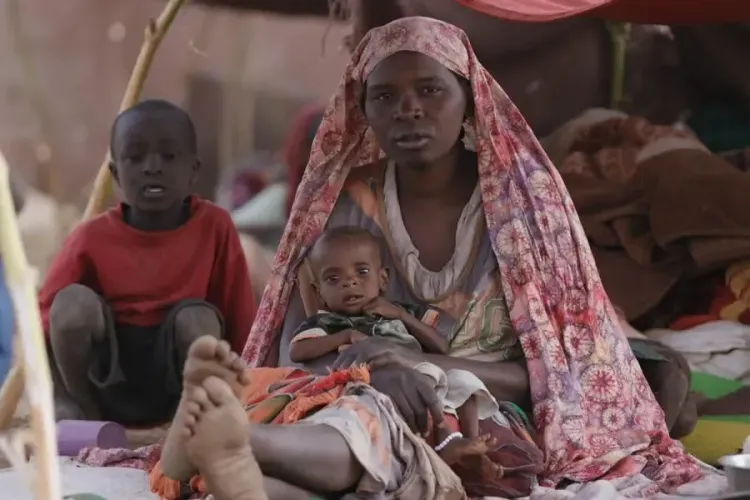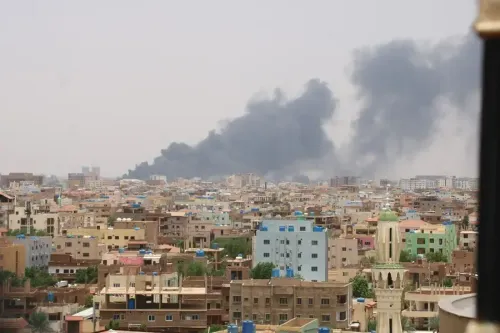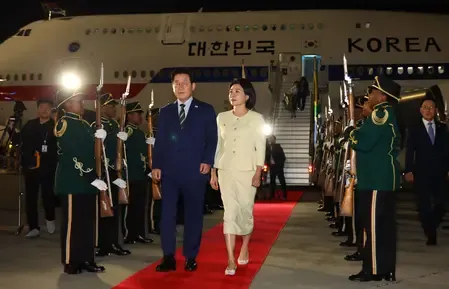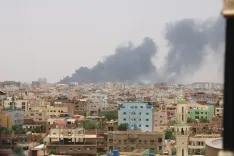Can the UN Secure a Halt in Sudan's Hostilities to Aid Families in El Fasher?

Synopsis
Key Takeaways
- Ceasefire Needed: Urgent call for a pause in hostilities in Sudan.
- Humanitarian Access: Essential aid is required for families trapped in El Fasher.
- Gender Inequality: Women face the highest risks of food insecurity.
- Cholera Outbreak: Ongoing cholera cases exacerbate the humanitarian situation.
- Funding Required: Immediate financial support needed to sustain humanitarian efforts.
United Nations, Aug 6 (NationPress) UN humanitarian organizations are advocating for a ceasefire in Sudan to facilitate access to families trapped in dire conditions, especially in the besieged city of El Fasher.
The UN Office for the Coordination of Humanitarian Affairs (OCHA) announced on Tuesday its demand for a cessation of hostilities to facilitate large-scale aid delivery and to restore a comprehensive UN presence.
"OCHA once again implores all factions to permit humanitarian access throughout the nation and urges donors to increase flexible funding to address Sudan's escalating humanitarian crises," the office stated.
Humanitarian needs are escalating due to factors such as insecurity, disease, malnutrition, flooding, and displacement, according to reports by Xinhua news agency.
UN Under-Secretary-General for Humanitarian Affairs Tom Fletcher emphasized that the threat of starvation is intensifying in El Fasher, the capital of North Darfur State, and time is of the essence.
OCHA has received reports indicating that intermittent shelling persists in the city. The situation remains precarious, with civilians suffering severely from the ongoing clashes between armed factions, leaving many families trapped in one of the nation's most heavily besieged urban areas.
The World Food Programme (WFP) reported that with trade routes severed and supply chains into El Fasher obstructed, essential food items like sorghum and wheat have skyrocketed in price—up to 460 percent more expensive than in other parts of Sudan.
Very few community kitchens established by local groups during the conflict to offer meals to the hungry are still operational.
Reports indicate that some families are resorting to consuming animal fodder and food waste as a means of survival. Many who managed to escape cited escalating violence, looting, and sexual assaults as reasons for their flight.
The UN Women’s Gender Snapshot report highlights that women disproportionately bear the consequences of the hostilities in Sudan.
The analysis reveals that female-headed households face three times the risk of severe food insecurity compared to their male counterparts. A staggering 75 percent of female-led households cannot meet basic nutritional requirements, while only 1.9 percent are classified as food secure, in contrast to 5.9 percent of male-headed households.
The study also indicates that 73 percent of women nationwide do not achieve minimum dietary diversity, jeopardizing maternal and child health.
"This crisis is fueled by pervasive gender inequalities, further exacerbated by conflict and displacement," stated UN Women. "As more women are compelled to head households—often due to the loss or disappearance of male relatives—they encounter the most significant obstacles to accessing food, income, and aid."
OCHA reported that cholera continues to spread across the Darfur region.
In North Darfur alone, humanitarian partners have recorded over 3,600 cases since late June, with more than 1,200 suspected cases and 69 deaths reported in South Darfur.
However, OCHA cautioned that underreporting may obscure the actual extent of the outbreak. While UN partners have responded to the crisis, limited access to clean water, sanitation, and medical supplies exacerbates the situation.
Nutrition needs are rapidly increasing.
"Recent assessments indicate global acute malnutrition rates exceeding emergency thresholds in all surveyed areas of North Darfur, reaching 34 percent in Mellit and nearly 30 percent in At Tawaisha," OCHA reported. "These statistics reflect a disturbing decline, not only in famine-risk areas but also across more broadly conflict-affected regions.
The United Nations and its humanitarian affiliates are ramping up outpatient therapeutic services and planning new stabilization centers in severely affected regions. Nonetheless, urgent funding is essential to maintain and broaden these efforts.









